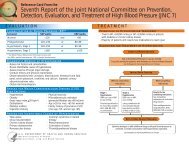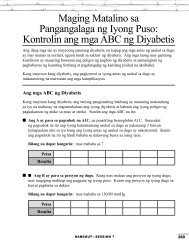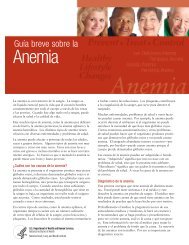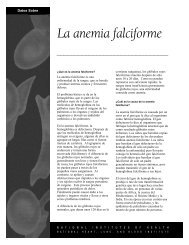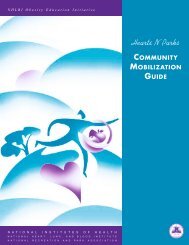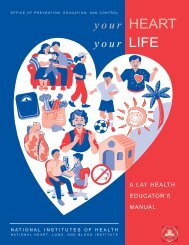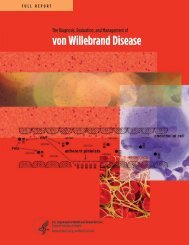WOMEN 'S HEALTH AND MENOPAUSE : - National Heart, Lung ...
WOMEN 'S HEALTH AND MENOPAUSE : - National Heart, Lung ...
WOMEN 'S HEALTH AND MENOPAUSE : - National Heart, Lung ...
You also want an ePaper? Increase the reach of your titles
YUMPU automatically turns print PDFs into web optimized ePapers that Google loves.
difficult to compare because of complex methodological<br />
issues, statistical power. and potential confounding<br />
variables.<br />
2.1 Hormone Replacement Therapy and<br />
Breast Cancer<br />
As with age at menopause, most<br />
information on HRT and breast<br />
cancer derives from a reanalysis<br />
of individual data from 51 epidemiologic<br />
studies, conducted in<br />
21 countries and including 52,705<br />
women with breast cancer and<br />
108,411 controls. 10 There are no<br />
available data<br />
from clinical trials<br />
investigating the<br />
relationship<br />
This showed a<br />
between HRT and 2.3 percent (95 percent CI, 1.1 to<br />
3.6 percent) increase in the RR of<br />
breast cancer.<br />
breast cancer for each year of<br />
HRT use among current or recent<br />
users (who stopped use 1 to 4 years previously).<br />
This corresponds to an RR of 1.35 (95 percent CI<br />
1.20 to 1.49) for those who had used HRT for 5<br />
years or more and to a cumulative excess for women<br />
who began use of HRT at age 50 of approximately<br />
2 cases/1,000 women for 5-year users, 6 cases/1,000<br />
women for 10-year users, and 12 cases/1,000<br />
women for 15-year users compared with never users.<br />
This increase was comparable with the effect of<br />
later menopause on breast cancer. This elevated risk,<br />
however, leveled off after stopping HRT use, with<br />
no significant excess risk observed at 5 or more<br />
years after stopping, as compared to never users.<br />
The use of HRT for a short time (i.e., < 5 years) to<br />
control menopausal symptoms is not related to any<br />
material increase in the risk of breast cancer, whereas<br />
long-term use increases breast cancer risk in current<br />
users. 10,21,29 The biologic mechanism underlying this<br />
association remains unclear. Changes in the composition<br />
of the breast tissue have been documented,<br />
with greater mammographic density (an established<br />
risk factor for breast cancer) noted following<br />
hormone use. 30,31 Also of interest is whether genetic<br />
factors, including polymorphisms in hormonemetabolizing<br />
genes, might be etiologically involved.<br />
Further research in this area is critically needed.<br />
226<br />
Another open question is the impact on breast cancer<br />
risk of the combination of estrogen and progestin,<br />
a replacement therapy effective in reducing<br />
the excess endometrial cancer risk associated with<br />
estrogen use alone. 32 There are biologic reasons to<br />
suspect an unfavorable effect of added progestin<br />
on breast carcinogenesis, since ovulatory cycles<br />
are related to breast cancer risk and breast mitotic<br />
activity is higher during the luteal phase of the<br />
cycle (when progesterone levels are at their highest).<br />
33,34 An early report of a Swedish cohort study 35<br />
suggested that combined HRT may be more<br />
strongly related to breast cancer risk than estrogen<br />
alone, with a nonsignificantly elevated RR of 1.2<br />
for ever use and of 4.4 for more than 6 years use<br />
of combined HRT (95 percent CI 0.9 to 22.4),<br />
based on 10 cases (hence a wide CI); the RR was<br />
1.8 (1.0 to 3.1) for > 9 year use of estrogen alone,<br />
on the basis of data on 23 cases). An update of the<br />
same study 36 confirmed these findings, showing<br />
RRs of 1.4 (95 percent CI 0.9 to 2.3) after 1 to 6<br />
years and 1.7 (95 percent CI 1.1 to 2.6) after more<br />
than 6 years of use of combined HRT. The excess<br />
risk, however, appeared confined to recent users.<br />
No excess risk relative to short-term users was<br />
shown for users of estrogen alone. Three other<br />
studies from Britain, 37 Denmark, 38 and Sweden 39<br />
showed an association between combined HRT<br />
and breast cancer. A report from the American<br />
Nurses’ Health Study cohort 40 confirmed some<br />
excess breast cancer risk among current long-term<br />
HRT users versus never users: the RRs were 1.3<br />
(95 percent CI 1.1 to 1.5) for conjugated estrogen<br />
users, 1.3 (95 percent CI 1.0 to 1.7) for other estrogen<br />
users, and 1.4 (95 percent CI 1.2 to 1.7) for<br />
estrogen plus progestin. A large case-control study<br />
(N = 3,345 and 3,454) in Sweden risk showed a<br />
significant increasing risk with duration of different<br />
types of combined estrogen-progestin use (OR<br />
of 3.0 for women treated for more than 10 years). 41<br />
A recent report of 46,355 participants followed for<br />
a mean of 10.2 years in the Breast Cancer<br />
Detection and Demonstration Project (BCDDP)



